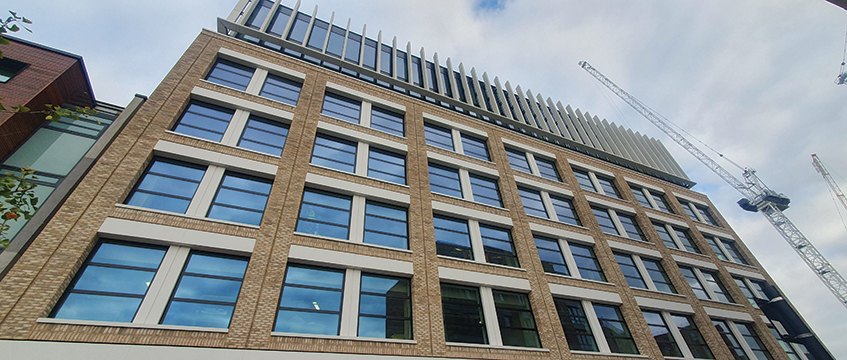When construction, fit-out and engineering group ISG called in the administrators in September, it left a long list of real estate clients scrambling to ensure projects could be kept on track.
Among them was the team at the London BioScience Innovation Centre, the Royal Veterinary College-owned life sciences and technology campus in King’s Cross. ISG was the main contractor and was halfway through a 22-week work programme when it ceased trading.
Ready to press play
“We had to press the pause button on the development,” LBIC chief executive Rich Ferrie told EG. “Now we are pressing play again, and we are delivering exactly the facility that we promised we would.”
LBIC has appointed Epiphany to resume the fit-out of incubators and amenity spaces across more than 37,000 sq ft and four floors at the seven-storey Apex in King’s Cross, NW1. The building is one of five mixed-use developments in the wider 600,000 sq ft scheme, known as Tribeca, being delivered by Reef Group in partnership with BlackRock Alternatives.
LBIC offers leases starting from one year with monthly break options. The centre was about 35% prelet prior to ISG entering administration. Among the early movers were novel vaccine developer Baseimmune, which has agreed to occupy 3,350 sq ft of lab and office space, and next-gen cell therapy engineer Laverock, which took a 4,112 sq ft suite.
LBIC had expected to open the doors in December, but ISG’s administration meant it was forced to push back the opening date by eight weeks to early February next year.
“We are still delivering our building within the agreed lease terms,” Ferrie said. “We have been open with [the tenants] about the challenges we have faced, and they will be staying with us.”
Competitive landscape
That is not to suggest those occupiers would not have other options. MedCity and London & Partners estimate that lab space in London will hit 2m sq ft as soon as 2026. As well as Tribeca, developments featuring incubator space include Victoria House, WC1, in Bloomsbury, which is being transformed by Oxford Properties and Pioneer Group. In addition, Kadans has its innovation centre already operational at 20 Water Street, E14, in Canary Wharf, and the newly-launched Mayde at Brandon Road, N7, in King’s Cross.
“Companies have a choice about where they wish to locate,” Ferrie said. “What we are finding is that companies want to locate here in the knowledge quarter because it is a special place for doing biomedical science.”
He added: “We are not frightened of competition. It keeps us wanting to be the best we can be and we are confident in our value proposition. We have a lot of interest in the rest of the space and we are very excited about the prospect of having a new building.”
LBIC is now pressing ahead with furnishing labs and offices, measuring around 3,000 sq ft each. It collaborated with prelet occupiers on designs, including measures such as extra walls to divide the lab space into two, adding doors, and creating additional storage.
More than half of the innovation centre will comprise amenity space, designed with collaboration in mind.
Ferrie said: “We had a focus group of existing clients and other people in the space to make sure that we configured the building in a way that would be useful and of the right standard for our target client profile.”
Getting it right
The idea behind the centre was to draw together a community of biomedical companies that can collaborate and engage with academic institutions.
“It’s a real selling point to attract new clients,” Ferrie said. “We find that the companies that join us really value being close to the Royal Veterinary College.”
The next piece of the puzzle is to make sure real estate owners and developers are making the right space in the right places to keep companies in the capital as they grow.
“The innovation potential of the London universities is great but the challenge has been anchoring those companies to stay within London,” Ferrie said. “There has been a chronic undersupply of space for biomedical innovation. In comparison with other cities, internationally, with strong research universities and a desire to be pre-eminent in biomedical innovation, that was limiting the development of the sector here.”
Ferrie and colleagues will hope that space such as Apex will help that development pick up pace – just a few weeks later than once planned.
See lettings information in London King’s Cross >>
Send feedback to Evelina Grecenko
Follow Estates Gazette











